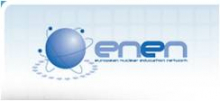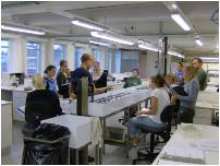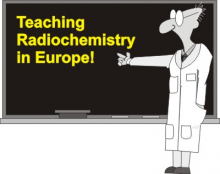Education, training and cross-cutting studies
ACTINET, CINCH, ENEN, ENETRAP, EURAC, EUTERP, FUTURAE
| ENETRAP - European Network on Education and Training in Radiological Protection | |
|---|---|
 | The ENETRAP series of projects initially started under the 6th Framework Programme to ensure high quality education and training in occupational, public and environmental radiation protection.
|
| ENEN - European Nuclear Engineering (Education) Network (ongoing) | |
|---|---|
 | The European Nuclear Engineering Network project was funded under the 5th Framework programme. It established a basis for conserving nuclear knowledge and expertise, created a European High Education Area for nuclear disciplines, and initiated the implementation of the Bologna declaration in nuclear disciplines.
|
| EURAC - Securing European Radiological Protection and Radioecology Competence to meet the Future Needs of Stakeholders (2005) | |
|---|---|
 | The objectives of EURAC were to assess the current and potential levels of post-graduate university provision in radiological protection, radioecology and radiochemistry, to survey the needs of European stakeholders and to develop innovative solutions to meet their identified needs. Following consultation, recommendations were made for potential masters programmes (including one in Radioecology). Information on a European Masters of Science in radioecology can now be found on the Training & Education pages of the Radioecology Exhange website.
|
| EUTERP - European Training and Education in Radiation Protection (2006-2009) | |
|---|---|
The EUTERP project was funded by EC DG Transport and Energy with the objectives to:
| |
| ACTINET - European Network for Actinide Sciences | |
|---|---|
 | ACTINET is a network of excellence dedicated to actinide sciences which started within the 6th Framework Programme in 2004 and continues within the 7th Framework. It aspires to improve European expertise in the broad field of actinide sciences. The ACTINET consortium has major experimental facilities, possibilities for education and training, capacities for applied and academic research.
|
| CINCH - Cooperation in Education the Nuclear Chemistry | |
|---|---|
 | NukWik was created as part of the CINCH EU-project which is an educational and training project for evaluating and planing radiochemistry teaching in Europe and is funded by the 7th Framework Program of the European Commission (Euratom). It is primarily aimed at nuclear chemistry teaching at Universities.
|
| FUTURAE - Assessment of the present situation of research in radioecology in Europe (2006-2008) | |
|---|---|
 | The objective of the FUTURAE project was to evaluate the feasibility of network(s) of excellence to maintain and enhance competence in a resource efficient manner and to enhance sustainable collaboration in the field of assessment and management of the impact of radionuclides on man and the environment. The STAR project was initiated on the basis of the findings of FUTURAE.
|
